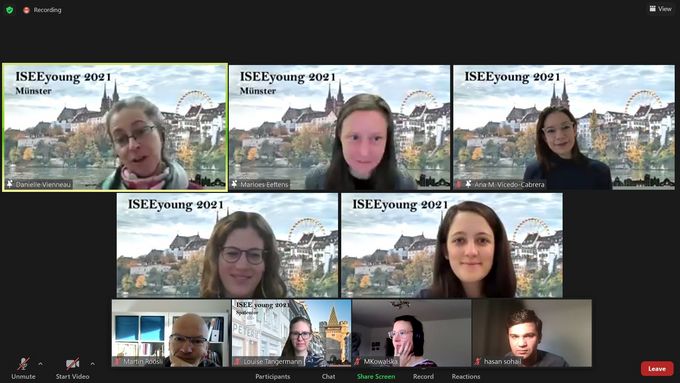Young Researchers in Environmental Epidemiology Share Latest Findings
19.02.2021
Swiss TPH and the European Chapter of the International Society of Environmental Epidemiology (ISEE) hosted a virtual symposium for young scientists in the field of environmental epidemiology from 18 to 19 February 2021. Over 200 participants came together to exchange experiences, discuss research findings and promote scientific communication.

ISEE Young targets early career researchers, including students (MSc, PhD), postdocs and assistant professors.
The ISEE Young conference focused on the impact of environmental exposure such as air pollution and noise as well as weather and climate on non-communicable diseases. Participants also presented on nutrition, pesticides, allergies, urban planning and other topics. The programme included a diverse mix of scientific sessions, interactive networking opportunities such as a panel of journal editors and even a virtual fitness session.
Swiss TPH as host organisation
This 4th edition of the ISEE Young conference was organised by ISEE Europe and Swiss TPH. “We are very pleased to host the ISEE Young virtual conference at Swiss TPH,” said Danielle Vienneau, co-organiser and Group Leader at Swiss TPH. “With a line-up of many renowned speakers, together with talented students and young researchers, we are able to promote quality science exchange and make important strides in public health and environmental protection.”
From transportation noise to infant nutrition
Among the keynote speakers was Maria Foraster from ISGlobal who talked about the health effects of transportation noise. Transportation noise is estimated to be the second most important environmental health hazard in Europe, just after air pollution. “Awareness on the topic is rather limited and more and better research is still needed to understand the multiple health effects of noise in order to promote more efficient policies,” she said.
Another keynote speaker, Nina Louise Torcelino-Iszatt from the Norwegian Institute of Public Health presented data on the effects of environmental pollutants on the infant gut microbiome. “The gut microbiome has an important role in human health, and we think it could be one pathway through which pollutants affect health,” she explained. “We found that environmental pollutants measured in breastmilk were indeed associated with a disrupted infant microbiome in the Norwegian Microbiota Cohort.”
Timely discussions on the importance of quality data
In a plenary panel on the first day, Andy Haines, London School of Hygiene and Tropical Medicine, Barbara Hoffmann, University of Düsseldorf, and Manolis Kogevinas, ISGlobal, discussed the role of the COVID-19 pandemic for environmental epidemiological research, and how the crisis demonstrated that challenges can only be tackled in joint efforts. This conference presented thus a timely opportunity to share new ideas and research results among peers. Evidence based policy needs high quality data and research, which eventually leads to better health for the population. Another important aspect discussed was the broad communication with the public to counter fake news.
New standards in virtual conferencing
The conference was not only a great opportunity for young researchers to engage but also set new standards in terms of virtual conferencing. “The effort of the organisers to make our virtual event come to life was truly amazing,” said Martin Röösli, Head of the Environmental Exposures and Health unit at Swiss TPH. “The agenda consisted of many interactive elements such as speed talks, morning yoga, break-out sessions and more, enabling high-quality networking with a minimal carbon footprint.”
Stay connected
Subscribe to our newsletter and get all the latest research news, project updates, course and event listings from Swiss TPH.